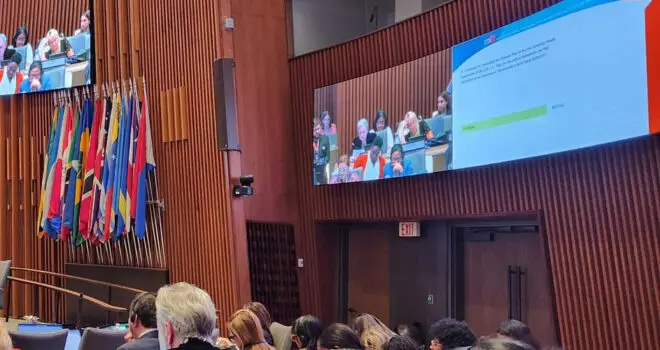Download the press release in French | Spanish
Cardiovascular disease (CVD) remains biggest killer, claiming 18.6 m lives per year
Geneva, 29 September 2021 – On World Heart Day, 29 September 2021, the World Heart Federation (WHF) is calling on the international community to bring digital cardiovascular health services to millions worldwide in order to decrease mortality from the world’s biggest killer. COVID-19 has seen an explosion in telemedicine, with a 40%1 jump in the world’s richest countries. WHF believes this digital transformation presents a pivotal opportunity for millions living with cardiovascular disease from lower income backgrounds who have little access to in-person consultation.
CVD claims the lives of 18.6 million people per year and 520 million people living with CVD have been disproportionately affected by COVID-19.
WHF is calling for equity across healthcare, and for the rapid development in digital care to reduce inequalities by transforming the diagnosis, prevention and management of CVD in lower-and middle-income settings.
Currently only 20%2 of the population in lower income countries is online. WHF is calling for operators to fund and develop the infrastructure to reach disconnected hearts everywhere; governments to prioritise digital infrastructure and heart health in policy; industry to keep prices of tech affordable; and telecoms service providers to collaborate with them to bring digital medicine to some of the world’s poorest communities across the globe.
“Never before have we seen such a ‘techceleration’ in cardiology,” says Fausto Pinto, President of the World Heart Federation. “This is a once in a lifetime opportunity to transform the lives of millions of people who are left behind in healthcare today. We should use digital health to scale up and speed up prevention efforts and save lives and millions spent on care.”
From online consultations, to simple Electrocardiograms (ECGs), blood pressure monitoring, to virtual surgery, the web has opened new possibilities to cardiovascular care for millions. As with all rapid digital transformation, there are challenges. For healthcare, top concerns are data privacy, technology compatibility and the need for human contact. According to WHF, co-designing programmes with patients will also be critical.
Adrian Lovett, CEO of the World Wide Web Foundation, which campaigns for equal access to the internet and a web which is fair for all, says “While telehealth technologies could be a game-changer for the world’s health, there’s a huge digital barrier keeping billions out of this system. Almost half the globe lives without a basic internet connection and many more people lack the technology they need to use digital healthcare services. To fully unleash the promise of the web to improve treatment and protect lives, leaders must invest to expand internet access to everyone.”
World Heart Day is supported by leading pharmaceutical companies AstraZeneca, Boehringer Ingelheim and Lilly Alliance, and Pfizer.
Joris Silon, Senior Vice President, Cardiovascular, Renal and Metabolism BioPharmaceuticals Business Unit at AstraZeneca said, “At AstraZeneca we are focused on developing and delivering life-changing medicines and solutions for the millions of people affected by cardiovascular disease by fundamentally transforming care for the millions of people with cardiovascular, renal and metabolism diseases. We know just how important it is to collaborate with others who share our vision to accelerate this change and deliver innovative solutions.”
He continued “Working with digital health innovators we are harnessing the power of digital and data science to speed the discovery and delivery of new medicines and optimise support for patients throughout their health journey. Never has there been a more important time to engage with organisations like the World Heart Federation.”
Waheed Jamal, M.D., Corporate Vice President and Head of CardioMetabolic Medicine, Boehringer Ingelheim said, “The pandemic drove the uptake of digital solutions much faster than expected. It is now crucial to increase the use and scope of telemedicine to include disease awareness and facilitating patient access to medical care. As for the longer-term outlook, it will be critical to improve cardiovascular disease prevention by addressing various risk factors such as diabetes and chronic kidney disease, accompanied by a holistic approach to patient care.”
Suneet Varma, Global President Pfizer Rare Disease, added, “We must continue advancing technology to help shape the future of equitable access to healthcare. This is particularly true for rare and lesser-known conditions, such as transthyretin amyloid cardiomyopathy, where digital connections can improve awareness, education and access to information and care.”
The general public is encouraged to get involved in World Heart Day by joining the conversation across social platforms using the hashtag #UseHeart.
The World Heart Federation is hosting a Heart to Heart debate, bringing together leading cardiologists, digital experts and journalists in a high-level panel to discuss how digital can transform the future of cardiovascular healthcare globally.
ENDS
Notes to Editors
- Media Contact: Borjana Pervan, Communications Director, World Heart Federation: borjana.pervan@worldheart.org
- Interviews: bios and headshots spokespeople can be found here. Please contact Aline Bochenek-Benoit, Campaign Manager, World Heart Federation aline.bochenek-benoit@worldheart.org or +41228070325.
- Link to images: Dropbox
- Heart to Heart debate: Can digital help make every heart equal? 28 September 2021, 2pm CET, 60 minutes, live streamed on Twitter. Learn more here
- Sources:
- About World Heart Day: World Heart Day is celebrated each year on 29 September to raise awareness and mobilize international action against cardiovascular disease (CVD), the leading cause of death on the planet. It is the global initiative under which individuals, governments and the entire heart community come together to engage in fun activities, increase public education, and advocate for universal access to CVD prevention, detection and treatment. For more information, visit http://worldheartday.org.
- About the World Heart Federation: The World Heart Federation (WHF) is an umbrella organisation representing the global cardiovascular community, uniting patient, medical, scientific, and civil society groups. Together with its Members, WHF influences policies, shares knowledge and inspires behaviour change to achieve heart health for everyone. For more information, visit www.world-heart-federation.org.
- The World Wide Web Foundation was established in 2009 by web inventor Sir Tim Berners-Lee and Rosemary Leith to advance the open web as a public good and a basic right. We are an independent, international organisation fighting for a safe and empowering web for everyone. webfoundation.org
- About AstraZeneca in CVRM: Cardiovascular, Renal and Metabolism (CVRM), part of BioPharmaceuticals, forms one of AstraZeneca’s main disease areas and is a key growth driver for the Company. By following the science to understand more clearly the underlying links between the heart, kidneys and pancreas, AstraZeneca is investing in a portfolio of medicines for organ protection and improve outcomes by slowing disease progression, reducing risks and tackling co-morbidities. The Company’s ambition is to modify or halt the natural course of CVRM diseases and potentially regenerate organs and restore function, by continuing to deliver transformative science that improves treatment practices and CV health for millions of patients worldwide. www.astrazeneca.com/our-therapy-areas/cardiovascular-renal-and-metabolism.html
- About Boehringer Ingelheim and Lilly alliance: The Boehringer Ingelheim and Lilly Alliance are driven to transform care for people with cardio-renal-metabolic conditions, a group of interconnected disorders that affect more than one billion people worldwide and are a leading cause of death. The cardiovascular, renal and metabolic systems are interconnected, and share many of the same risk factors and pathological pathways along the disease continuum. Dysfunction in one system may accelerate the onset of others, resulting in progression of interconnected diseases such as type 2 diabetes, cardiovascular disease, heart failure, and kidney disease, which in turn leads to an increased risk of cardiovascular death. Conversely, improving the health of one system can lead to positive effects throughout the others. This World Heart Day, they are proud to continue to support the World Heart Federation. Through their research and treatments, their goal is to support people’s health, restoring the balance between the interconnected cardio-renal-metabolic systems and reducing their risk of serious complications. As part of their commitment to those whose health is jeopardized by cardio-renal-metabolic conditions, they will continue embracing a multidisciplinary approach towards care and focusing our resources on filling treatment gaps. https://www.boehringer-ingelheim.com/
- About Pfizer in Rare Disease: Rare disease includes some of the most serious of all illnesses and impacts millions of patients worldwide, representing an opportunity to apply our knowledge and expertise to help make a significant impact on addressing unmet medical needs. The Pfizer focus on rare disease builds on more than two decades of experience, a dedicated research unit focusing on rare disease, and a global portfolio of multiple medicines within a number of disease areas of focus, including rare hematologic, neurologic, cardiac and inherited metabolic disorders. Pfizer Rare Disease combines pioneering science and deep understanding of how diseases work with insights from innovative strategic collaborations with academic researchers, patients, and other companies to deliver transformative treatments and solutions. We innovate every day leveraging our global footprint to accelerate the development and delivery of groundbreaking medicines and the hope of cures. https://www.pfizer.com/science/rare-diseases


